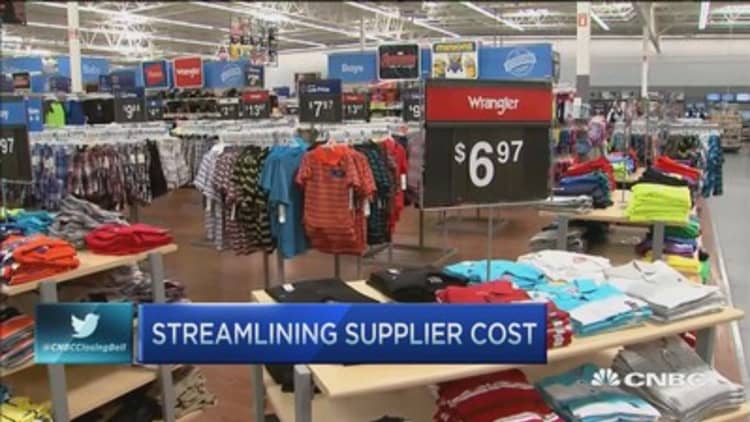As if the retail sector wasn't fickle enough, the first half of the year threw it a number of curveballs.
After contending with port strikes, a long winter and the impact of a stronger dollar, retailers are hoping to move past the noise in the second half, when between back-to-school and the winter holidays, they really make their numbers.
While most retailers finally have merchandise that was tied up in delays from prolonged contract negotiations at the West Coast ports, a number of them have already increased clearance and promotional levels to clear through the backlog. Although this is a win for consumers, it will likely take a hit on those retailers' margins that have to sell goods for less than they'd planned.
For Gap in particular, the second half of the year could remain difficult. Not only is it slashing prices on merchandise that was late to stores because of the port congestion, but the product at its namesake Gap and Banana Republic stores has not resonated with shoppers.
Read MoreGap closing 175 stores
CEO Art Peck has instituted a number of changes, but because most of the holiday merchandise was ordered months in advance of the shift in design and strategy, Gap has warned investors not to expect much sales improvement at these two nameplates until spring.
Investors will also be watching names like Ralph Lauren, Tiffany and Michael Kors to see if they will better manage the effects of a strong U.S. dollar. The currency's quick rise caused several pain points during the first half, one being that it becomes more expensive for international tourists to buy goods. This has taken a toll on higher-end retailers and brands.
Another issue caused by a stronger U.S. dollar is the translation of foreign sales, or overseas costs, back into the currency. Wal-Mart is one retailer where this became particularly significant in the first half—and it will continue to weigh on the company as the year progresses.
Teen retailers Urban Outfitters, American Eagle, Aéropostale and Abercrombie & Fitch will be banking on back-to-school spending to lift revenues. But apparel sales are likely to shift later into the third quarter, as more students are waiting to buy until they see what their friends are wearing.
Read MoreBack-to-school spending seen rising, but...
The good news for many retailers is that several companies have said denim sales are ticking back up, just in time for back to school.
However, when it comes to the teen sector, there are still many question marks. Abercrombie is in the midst of shifting various strategies, from its employee dress and hiring codes to its stores' atmosphere and merchandise.
Both Abercrombie & Fitch and American Eagle are still looking to fill the CEO roles. Chairman Arthur Martinez, chief operating officer Jonathan Ramsden, Abercrombie brand president Christos Angelides and Hollister's head Fran Horowitz are sharing the responsibilities of running the business. American Eagle's board chairman, Jay Schottenstein, has done since January of the same year.

J.C. Penney will soon have a new CEO, as President and CEO designee Marvin Ellison officially takes the reins Aug. 1. When asked what investors can expect under his leadership, Ellison told CNBC last month that "[J.C. Penney] is going to set aggressive financial targets, and we are going to do it on an annual basis."
Ellison has worked with Ullman to develop the department store's current strategy, but said there may be "some strategic changes happening in 2016."
While Target hasn't telegraphed exactly how it will refocus on its signature categories (baby, kids, style and wellness), CEO Brian Cornell is making assertive moves to get the big-box retailer there as quickly as he can. Investors should expect bold moves and announcements to continue into the second half of the year.
Ahead of his one-year anniversary at the retailer's helm in August, Cornell has already made major changes. They include exiting its failed Canadian business, selling its pharmacies to CVS and moving chief merchandising officer—and 30-year company veteran—Kathee Tesija into an advisory role.
Correction: This story has been updated to properly reflect the interim leadership roles at Abercrombie & Fitch.


